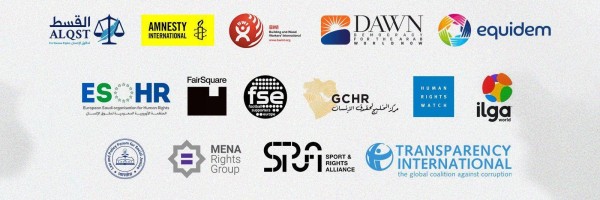Today, 19 November 2024, ALQST for Human Rights released its latest briefing paper on the wide range of concerns regarding Saudi Arabia’s Neom megacity project. They include the risk of widespread labour rights abuses, brought into focus once again by a string of failures surrounding the death of a worker on a Neom construction site, and the devastating effects on the environment.
Last year our groundbreaking report The Dark Side of Neom detailed grave abuses in terms of the forced displacement and prosecution of the region’s longstanding inhabitants, the Huwaitat tribe. This new briefing highlights additional concerns, making clearer than ever the serious moral challenges and reputational risks for potential partners and investors in the project.
Neom, a flagship project of Crown Prince Mohammed bin Salman’s “Vision 2030” economic plan, is one of five host cities featured in Saudi Arabia’s 2034 World Cup bid. It includes as its centrepiece a futuristic 200-metre-wide linear city, “The Line”, originally designed to be 170 km long but reported to have been significantly scaled down.
First death of a migrant worker on a Neom site documented by ALQST
As with the World Cup as a whole, a major concern over its development, given the prevalence of labour exploitation and abuses in the country, relates to labour rights, in particular the rights of hundreds of thousands of migrant workers.
The risks were featured in a recent British television documentary, Kingdom Uncovered: Inside Saudi Arabia, and can be clearly seen from the circumstances surrounding the death on 28 December 2023 of Abdul Wali Skandar Khan, a 25-year-old Pakistani civil engineer and father of two who died after a guardrail collapsed at a Neom construction site. The companies involved failed to conduct a proper investigation, and his brother, Meer Wali Khan, had to travel at his own expense to retrieve Abdul Wali’s body from Saudi Arabia. The family is still battling for compensation and accountability.
Meer Wali Khan comments: “The companies and Saudi authorities have treated my brother with callous disregard. At every stage since his death, they have failed to act sufficiently, causing me and my family even more pain and hardship. As such, our quest for answers and justice continues, for Abdul Wali and others who have suffered a similar fate.”
Environmental and socioeconomic questions over Neom
The scope of concerns around Neom goes well beyond violations affecting the area’s inhabitants and migrant workers, however. Our briefing also explores the project’s environmental impact and issues such as digital surveillance. The risks Neom poses to the regional ecosystem, its vast carbon footprint, and the volume of raw materials needed, stand in conflict with its stated ambition to be a “green megacity of the future”. Moreover, the extravagant and surreal plans for Neom – a top-down project – do nothing to address the stark deficiencies in the country’s broader infrastructure and the real-world daily struggles faced by many Saudi citizens.
Business responsibility and corporate due diligence
In light of these profound concerns, all businesses involved or considering involvement in Neom have a responsibility to avoid complicity in human rights abuses and prevent any adverse impacts taking place. ALQST’s briefing is designed to help them fact-check the claims being made about the project when weighing their decisions.
ALQST’s Executive Director Julia Legner comments: “Neom’s development relies heavily on international investment and partnerships, making foreign businesses some of the best-placed actors with real power to challenge Saudi Arabia’s authorities. We urge them to look closely at the evidence, and take the appropriate action.”
ALQST urges companies involved in the project to use all the leverage at their disposal to advocate for the cessation of rights abuses related to Neom, for the release of members of the Huwaitat tribe who have been wrongfully imprisoned, and for justice for migrant workers like Abdul Wali Skandar Khan.




